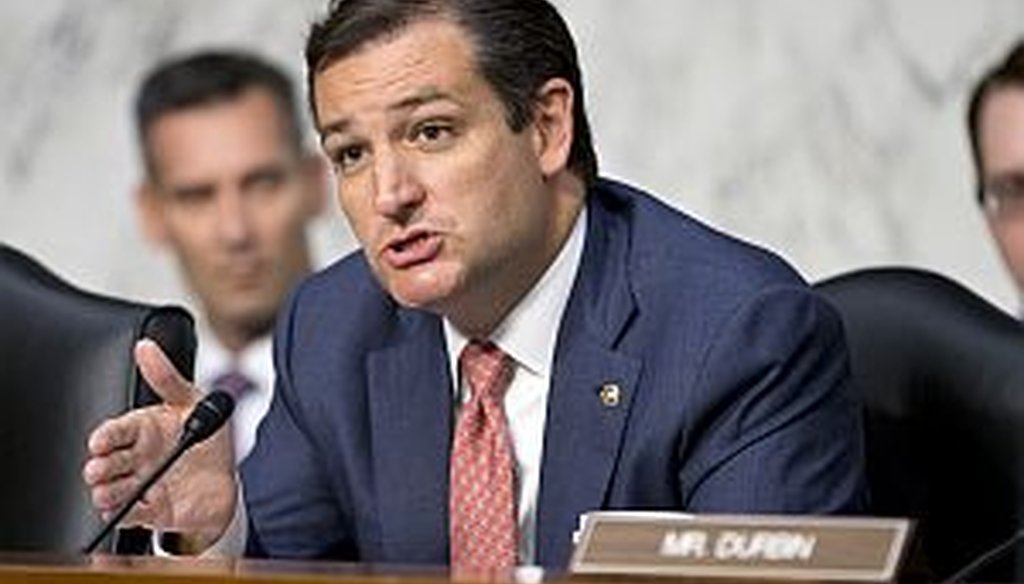Stand up for the facts!
Our only agenda is to publish the truth so you can be an informed participant in democracy.
We need your help.
I would like to contribute

Sen. Ted Cruz, R-Texas spoke on Capitol Hill in Washington last month.
The battle over health care reform seems never ending. Just before House Republicans headed home for the summer recess, they voted yet again to repeal the Affordable Care Act, commonly called Obamacare.
Sen. Ted Cruz, R-Texas, is a leading voice in the Senate against the health care law. In a floor speech, he urged Congress to exclude any money to implement Obamacare from upcoming spending bills. Blocking the health care law, he argued, was vital to the country’s economic recovery.
"There is no legislation currently in effect that is damaging the economy more or damaging jobs more than Obamacare," Cruz said.
Economic forecasters put a lot of time and thought into the factors that drive economic growth and employment. We decided to match up their assessments against Cruz's rhetoric.
What the economic forecasters say
Sign up for PolitiFact texts
As far as things Washington can influence, economists talk about taxes, spending, the Federal Reserve, raising the national debt limit and related items. When it comes to the economy, we found the attention of economists isn't on the health care law. It’s on the 2011 Budget Control Act.
That law, known collectively as the sequester, mandated automatic, across-the-board spending cuts. In fiscal year 2013, Washington is on track to tighten its belt by about $85 billion, with another $90 billion in reductions slated for 2014. At the same time, a temporary payroll tax relief measure was allowed to expire, which left most Americans with about 2 percent less in their paychecks. That pulled about another $125 billion out of the economy.
We reviewed the publicly available research on the economy from a group of nearly 50 prominent forecasters, the ones the Wall Street Journal assembles each year to provide a cross section of opinions. That list includes large organizations such as Morgan Stanley, small consulting firms such as Mesirow Financial, and academic centers such as the University of Central Florida.
Our review showed that roughly three-fourths of the forecasters talked about the sequester, compared with about a quarter who talked about the health care law.
Several economists told us why they were far more likely to focus on the sequester than Obamacare.The biggest reason: With the sequester, the numbers are clear while with the health care law, they are not.
"The difference between the sequester and the ACA is that we have hard data on the former and just some survey data on the latter," said Joseph Carson, senior vice president and director of global economic research at AllianceBernstein. "Also, estimating the impact on something that may happen is different than assessing the impact of something that has happened."
Not only are forecasters still waiting to see the impact of the health care law’s most significant changes, many of them said it isn’t a macroeconomic issue in the first place. Macro-level factors are things like interest rates, the number of dollars the Federal Reserve puts into circulation, productivity and so forth. Microeconomics has to do with markets and who pays how much for goods or services.
Assessing the health care law "requires reading materials that are more micro than macro in nature -- employee benefit studies, etc.," said Susan Sterne, president and chief economist at Economic Analysis Associates. (Sterne, by the way, ranked third for most accurate on the Wall Street Journal list). "I spent many days on the potential consumer impact and still had many questions. It is not easy."
This isn’t to say that these forecasters dismissed the impact of the Affordable Care Act on jobs.
"The economic costs of the new health care act are being underestimated," said John Lonski, managing director and chief economist at Moody’s Capital Markets group. Lonski said the law could be causing people to work fewer hours or prompting small businesses to hold off hiring. That would lead to a material loss of economic activity, even if it’s hard to measure.
A July economic assessment from Wells Fargo Bank said sluggish hiring might stem from employers trying to minimize the effect of the health care law. Sen. Cruz’s office noted that in the Federal Reserve’s March economic update, employers in a couple of cities said the Affordable Care Act had led to layoffs or hiring delays. There is no doubt many employers are concerned; Cruz’s office noted several surveys to that effect. The requirement to provide health insurance under Obamacare applies to firms with 50 employees or more.
Nariman Behravesh, chief economist at IHS, believes that over time, the new health care rules will increase the cost of doing business in the United States, and it will end up as a slight negative drag on the economy. However, Behravesh said the impact that he sees is not on the same scale as that of the Budget Control Act.
"The tax increases and spending cuts (of the sequester) have reduced growth a full percentage point," Behravesh said. "For the Affordable Care Act, the effect is there, but it’s not a big dent in growth. Maybe a tenth or two of a percent."
In sum, for most of the country’s top economic forecasters, the Budget Control Act is a much bigger economic deal than Obamacare, if only because the dollars tied to the sequester are tangible and the biggest elements of the Affordable Care Act have yet to unfold.
We should note that Cruz has an entirely different view of the Budget Control Act. His press secretary, Catherine Frazier said it "has not and will not harm the economy."
Analysis from the Congressional Budget Office
When it comes to finding an independent assessment of legislation, we often turn to the Congressional Budget Office, the nonpartisan analytic arm of Congress. On the sequester, the Congressional Budget Office’s latest figures say if the spending cuts ended now, it would boost growth by 0.2 percent to 1.2 percent and add 300,000 to 1.6 million more jobs by the end of the 2014 fiscal year. On the other hand, the report also said that in the long run, simply abolishing the sequester would undermine economic growth as the federal debt grew and eventually cut into the country’s output.
The Congressional Budget Office has been less certain about the economic effects of the health care law. We found no analysis that estimated the impact on the overall economy. As for jobs, in 2011, the CBO director told Congress that the new law would probably lead some people to work fewer hours. Basically, if they didn’t need to work or work as much to get health insurance, they wouldn’t. The CBO gave a rough estimate that some 800,000 people, through their own choice, would pull out of the workforce by 2021 once the health care law fully took effect. A report cited by Cruz’s office also suggested that outcome.
But the CBO said its analysis was full of uncertainty. The director said the actual impact on employment would be different and the new health care rules would shape the labor market "in ways that are difficult to anticipate or quantify."
In short, the CBO makes specific projections about the Budget Control Act slowing the economy but makes none for the Affordable Care Act.
Our conclusion
Overall, the evidence suggests that the health care law might be reducing hiring by some employers now, especially at smaller firms, and that it is likely to add to the cost of doing business down the line. But Cruz was comparing the Affordable Care Act to other acts of Congress and in that regard, the Budget Control Act has had a much greater impact on growth and jobs in the short run.
The country’s top economic forecasters and the CBO generally estimate that law cut growth by something in the range of one-half to 1 percent, with a corresponding loss of jobs. We didn’t find those kinds of assessments for the health care law. One forecaster figured that the health law might cut growth by one-tenth of a percent. That is at the macro level. On a smaller scale, among businesses with 50-100 workers, the effect might loom larger and that is a group that Cruz seems to have had in mind.
The information we have right now about the health care law and small businesses is real but anecdotal. In any event, it's not possible to extrapolate from them to the economy as a whole. In terms of the effects of the Budget Control Act and Obamacare on the broader economy, Cruz's words reflect a perspective that has gotten ahead of the full set of facts.
Our Sources
Office of Sen. Ted Cruz, Press release: Americans want economic growth back; we must stand together to defund Obamacare, July 30, 2013
Wall Street Journal, Ranking economists’ 2012 predictions: The best and worst, February 7, 2013
PolitiFact, Michele Bachmann says Obamacare will kill 800,000 jobs, June 14, 2011
Congressional Budget Office, CBO analysis of major healthcare legislation enacted in 2010, March 30, 2011
Congressional Budget Office, Letter to the Honorable Chris Van Hollen, July 25, 2013
Congressional Budget Office, The budget and economic outlook: Fiscal years 2013 to 2023, February 5, 2013
CNBC, Payroll tax hike will affect your paycheck and the economy, January 14, 2013
Wells Fargo, Monthly economic outlook, July 2013
Interview with Nariman Behravesh, chief economist, IHS Global Insight, August 2, 2013
Email interview with Susan Sterne, president and chief economist, Economic Analysis Associates, August 2, 2013
Email interview with Joseph Carson, senior vice president and director of Global Economic Research, AllianceBernstein, August 2, 2013
Email interview with John Lonski, managing director and chief economist, Moody’s capital markets group, August 2, 2013
Email interview with Mike Cosgrove, Econoclast, August 2, 2013
Email interview with Nick Perna, economic advisor, Webster Bank, August 2, 2013
Email interview with Ian Shepherdson, chief economist, Pantheon Macroeconomics, August 2, 2013
Email interview with Sal Guatieri, vice president and senior economist, BMO Capital Markets Economics, August 2, 2013
Email interview with Catherine Frazier, press secretary, Sen. Ted Cruz, August 5, 2013
Federal Reserve, Current economic conditions, March 6, 2013
Gallup, Half of U.S. small businesses think health law bad for them, May 10, 2013
National Bureau of Economic Research, Public Health Insurance, Labor Supply, and Employment Lock, July 2013
Medill Reports, Disappointing job growth vexes economists, June 5, 2013






















































